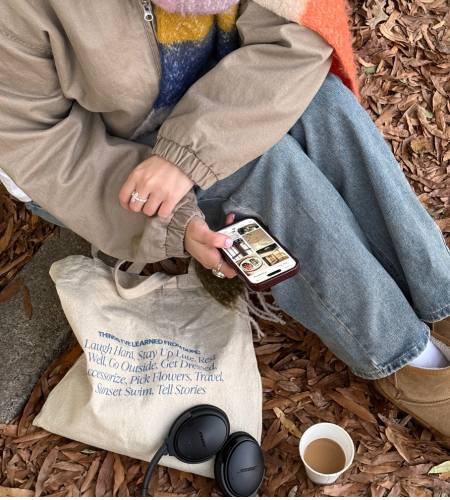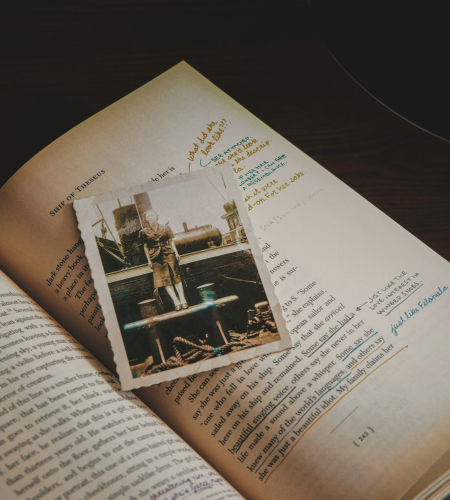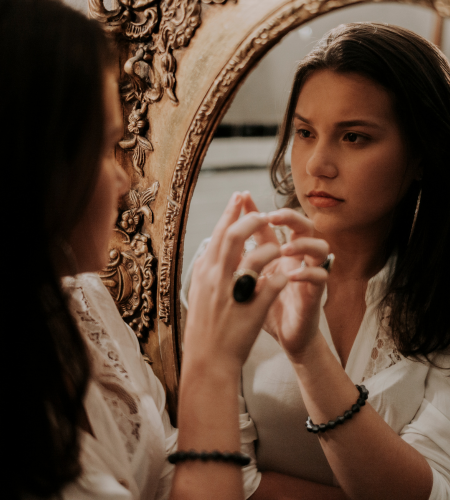
We all have trials and tribulations to overcome in life, but what if I told you that the way we perceive ourselves as adults often starts with our childhood? Many of us go through a rollercoaster journey of self-discovery when it comes to our confidence and sense of worth, yet often forget the humble beginnings this can have. From oversized anxieties buried deep within your subconscious, or external factors from peers influencing your own perception - there's no denying that how we were nurtured during childhood has an immense effect on how confident we are today. So grab a cup of tea, put your feet up and join me on this journey as I look at 7 common childhood elements that affect self-confidence and how to make changes for a brighter future!

1. Rejection (or lack of acceptance) from peers
Rejection or lack of acceptance from our peers can be one of the most damaging factors that affects our self confidence, and it's estimated that 10%-15% of children are rejected from their peer group. Rejection can come in many forms such as not being invited to social events, not getting chosen for a school activity or not making a team. Whatever it is, it can be hard to ignore those pangs of hurt that come with the feeling of being rejected.
Rejection in childhood often leads us down a path where we start to doubt ourselves and our abilities, while getting stuck in a negative, self-defeating thought pattern. We may stop pushing ourselves to try new things, take chances, and challenge our limits. Instead of feeling empowered and embracing every opportunity for growth, we can become overcome with fear and anxiety about being judged or disliked by others.
If you rejection in childhood has affected your self-confidence, here's some of my advice:
Find strength in your identity and focus on yourself instead of chasing after other people's validation or approval. Move forward with resilience and confront your fears, learning from them rather than backing away from them.
2. Bullying or teasing
Children who are bullied or harassed may develop a negative self-image and feel like they are not worthy of respect or kindness, which can lead to low self-confidence as adults. Factors such as age, ethnicity, social status, financial status, physical appearance and mental health can all affect how intensely we are bullied or teased.
It doesn't have to be constant bullying to affect our self confidence, even harmless jokes or put-downs can leave us feeling belittled and inadequate. Our inner voice takes these comments to heart and internalizes them as ‘truths’, making us feel like we don’t measure up or aren’t good enough.
If you have suffered from bullying or teasing in childhood, here’s some of my advice:
Bring awareness to the first time you were bullied, and identify the story you created around the bullying. What belief did you pick up about yourself? What decision did you make in that moment? Some common decisions kids make after being bullied are to become “invisible” to avoid attention, to "one-up" the bully and become one themselves, or to completely change themselves to fit in.
Recognizing these decisions and the stories you have created around them is the first step of changing your beliefs. Reframe the story by replacing it with new affirmations that are more empowering and help to boost your confidence. Instead, be mindful of the story you created and challenge that story by asking yourself how true it really is. Work on developing a healthier inner dialogue, surround yourself with people who make you feel accepted and appreciated, focus on your strengths and celebrate your uniqueness!
3. Limited support from those around you
When parents, guardians, or other important people in your life don't give you the support and encouragement you need, it can be really tough to feel like you're good enough or that your efforts are noticed and appreciated. Sadly, this often leads to low self confidence and a fear of taking risks and trying new things.
It's easy to see why lacking support can affect someone’s self-esteem so drastically - without that positive reinforcement and assurance it’s hard to stay confident in yourself and your abilities. No one wants to keep failing or not taking the chances that could lead to success if they lack the trust in themselves or their environment.
Not having a proper support system can do a number on kids when it comes to growing their resilience and feeling like they can take on the world. When children are left to fend for themselves through rough times, they can seriously struggle to find ways to deal with setbacks and hurdles. This can lead to a nagging doubt about their ability to tackle challenges, and spoiler alert: it doesn't just magically disappear when they become adults (wouldn't that be nice!)
To make matters trickier, not having that steady stream of "You've got this!" kinda support can mean the younger generation struggles to create healthy connections and social abilities. When there's a disappointing lack of solid role models or mentors in their lives, it can be tough for them to learn the art of good communication and forming tight bonds with others. Fast forward into adulthood, and this can make it super tricky for them to build relationships and find that all-important support network to help them tackle life's rollercoaster ride.
If this is something you experienced growing up...
It will be important for you to form a solid support system for yourself as an adult. Spend time with friends, take up a hobby that brings you joy and connection with others (like joining a sports team or music class), and find ways to build supportive relationships in your life. Also, make sure to put yourself first - rather than relying on external sources for validation, give yourself the love, appreciation, and encouragement you need.

4. Being consistently compared to others
It's demoralizing to always be compared to others. Children who are constantly compared to their siblings, peers, or even adults can develop a sense of inadequacy and low self-esteem, which can carry over into adulthood. Feeling like you'll never measure up to someone else's standard or expectations can be overwhelming and disheartening.
Being consistently compared to others can be a major source of insecurity in adulthood. It's easy to get caught up in comparison and start comparing yourself to everyone around you, all the time. This can lead to feelings of inadequacy, frustration and even depression if you don't feel like you measure up. Not only that, it can also lead to you believing that you lack certain qualities or skills, and be unable to recognize your true strengths. Comparison can make you feel helpless and disempowered in situations where you should be feeling confident and capable.
If you've been compared to others throughout your life, here's some of my advice:
Practice self-acceptance and focus on your own journey.
It's important to remember that every individual is unique. Remember that everyone's path in life is different and celebrate your accomplishments, no matter how small they may seem. It's ok to feel discouraged at times, but don't let these feelings stop you from believing in yourself and your abilities. Acknowledge the pressure for perfection, but don't let it take over your life.
Instead of focusing on the negative comparisons and feelings of inadequacy, focus on what makes you special and celebrate your skills and talents. Work towards developing a healthy relationship with yourself, and don't let the opinions of others define your self-worth or confidence. Remind yourself of your unique qualities and talents, and be proud of who you are at this exact moment.
Most importantly, remind yourself that you are enough just as you are. Believe that you are capable of achieving great things and make sure to build a strong network of supportive people around you!
5. Being overly criticized
Being overly criticized as a kid can have a huge impact on your self-confidence later in life. When parents, teachers and other authority figures bombard you with criticism, you start to believe that nothing you do is ever right! This often leads to feelings of worthlessness and low self-esteem that can follow up into adulthood.
When you're constantly being criticized as a child, it can really make you feel like you can never do anything right. All that negative feedback starts to add up and slowly chip away at your self-image. Before you know it, you start to believe that there's something wrong with you; like you're somehow inherently flawed and inadequate. This harmful mindset can stick around for years, making you feel unworthy of success or praise and stopping you from achieving your potential.
Constant criticism can manifest into a fear of failure. When children are constantly criticized for their mistakes, they may become afraid to take risks or try new things, for fear of being criticized again. This can lead to a lack of confidence in their abilities and a belief that they are not capable of achieving success or reaching their goals.
If you came from an environment where it felt like you were constantly being criticized, know that you are not alone. Here's some of my advice:
Identify and challenge your negative self-talk. Chances are the voice in your head is mimicking the things you heard from childhood and are reinforcing your belief that you are not good enough. By identifying negative self-talk and challenging these thoughts with evidence to the contrary, you can begin to reframe their beliefs about themselves.
If you're feeling weighted down by criticism in the moment, take a small step back and assess the situation objectively to gain a better understanding of the big picture before reacting. It may feel difficult initially, but doing so puts you firmly in the driver's seat of your own destiny by helping you to maintain an overall positive outlook.
No matter where you grew up, it's important not to let criticisms from your childhood overshadow who you are and what you can achieve today. Remind yourself that criticism doesn't define your self-worth. Find ways to focus on the positive and celebrate all your victories, big or small. Take charge of your life, believe in yourself and don't forget that you're capable of great things!
6. Failing to receive praise or positive feedback
Receiving a lack of positive affirmation from adults as a child can have a lasting effect on how you feel about yourself. Without praise or recognition, it's easy for kids to develop a belief that their actions are not worthy of recognition, creating factors that affect their self-confidence into adulthood.
When children do not receive praise or positive feedback, they may internalize the message that they are not good enough or that their efforts are not valued. This can create a negative self-image, and can create a sense of neglect or lack of validation. Children need positive reinforcement from their parents, teachers, and other authority figures to feel valued and appreciated. When that validation isn't there, they may feel neglected, leading to feelings of low self-worth and a lack of confidence in their abilities.
If this is a childhood factor affecting your self confidence, then...
Your remedy is to give yourself the praise and positive feedback that you never received as a child. Speak kindly to yourself, recognize your accomplishments and successes, and remind yourself of your strengths. Validate yourself and love yourself, even when others are unable to do so.
This may feel awkward at first, but small successes should be celebrated and rewarded instead of going unacknowledged. This can be the foundation for a deeper self love for you!


7. Receiving mixed messages
When kids get different messages from their moms, dads, or other grown-ups they look up to, it can be hard for them to have a strong sense of self and feel confident. If they're told they're smart but then given challenge that's too hard for them, it can leave them feeling confused and insecure about their abilities.
When kids get conflicting messages about their behavior, performance or abilities, it can create a ton of confusion and uncertainty that makes them doubt themselves. It's like having no idea what to believe and no clue how to interpret the feedback they're getting leading to a lack of confidence in their own talents and an overwhelming fear of failing or taking risks.
Also, kids who feel confused when they receive conflicting messages about who they are and what they should do, it can really mess with their sense of identity and purpose. It's totally understandable if this leaves them feeling unconfident in themselves or lost when it comes to making decisions or chasing after their dreams. This lack of consistent feedback or validation can make it hard to build any kind of self-worth or trust in your own abilities. End result? Low confidence when it comes to trying to navigate social situations, create relationships or reach success.
If this is something you experienced growing up, then...
Your remedy is to take the time to discover and reaffirm who you are without others' opinions. Find your own inner voice and trust it, even if it goes against what other people think. Remind yourself that you have control over how you interpret messages and feedback from the outside world — don't let them undermine your sense of self-worth. Instead, focus on the positive things that you can do and reinforce your own skills, values and passions.
Reprogramming Self-Confidence with Hypnotherapy
If any of these childhood factors have been holding you back, then hypnotherapy can be an effective tool for helping you to reprogram your beliefs. Hypnotherapy is a powerful form of guided relaxation that helps to access the subconscious mind where our deepest and oldest beliefs about ourselves reside. With my help as a certified hypnotherapist, you can start to change the way you think about yourself and create a new narrative that is based on your strengths and successes.
By using hypnotherapy, you can retrain your mindset to develop healthy self-esteem and confidence in yourself. With regular practice, you can start to replace negative thoughts with more positive ones, allowing yourself to build a strong foundation of self-confidence that can help you to achieve your goals.
The takeaway here is that although childhood experiences can affect our self-confidence, it doesn't have to be something we live with forever. With the right resources and tools, you can start to reprogram your beliefs and create a healthier mindset that allows you to trust in yourself and your abilities. You don't have to let the experiences from the past hold you back any longer!
Conclusion
It's important to remember that the list of childhood factors that affect self confidence above do not have to define you. They can be hard to deal with and can affect how we feel and experience life. But it’s possible to find ways to cope; it just takes time and effort.
From not receiving enough attention and praise to being exposed to negative messages or receiving conflicting information, it is important to recognize the sources of insecurity and work on building a strong sense of self-worth from within.
Remember that you have an inner strength and resilience within you that can be harnessed. Be proud of who you are and recognize your unlimited potential.
If you’re ready to make a change and put yourself first - download my Peace Maximizer hypnosis recording today. Not only will it help drown out the voice of judgement from those around you; but it'll also relax you and allow you to better handle any situation life throws at you with ease. So take back control and choose for yourself what (and who) influences how you see yourself in this world!








+ view comments . . .
+
view comments . . .
-